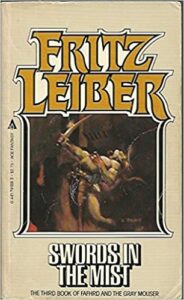Fritz Leiber gave the name “swords and sorcery” to the genre that his heroes, Fafhrd and the Gray Mouser, did so much to define. Both elements are plentiful in the third collection of their tales Swords in the Mist, which was first published in 1968. Four stories comprise the bulk of the volume. “Adept’s Gambit,” the longest and last, was published first, in 1947. “Lean Times in Lankhmar” is from 1959; “When the Sea-King’s Away” is from 1960; and “The Cloud of Hate,” which opens the volume, is the newest, from 1963. The remaining two bits are very short pieces that were written to smooth over what would otherwise be very abrupt transitions.
Three of the four main stories were still familiar to me forty years since I read them the first time, and probably at least twenty since I read them last. What gives these tales such staying power? Three things, I think. First, their directness. They are straight-up what-happens-next stories of suspense, daring and danger. They are other things, too, but first of all readers want to find out what happens and how the heroes get out of the scrapes they have gotten themselves into. In contrast to some of the stories in Swords Against Death, the stories in Swords in the Mist are not written as if Fafhrd or the Mouser might actually die, but there is still tension in finding out just how they will escape the latest predicament.
Second, their pacing. “The Cloud of Hate,” for example, alternates between a relatively idle philosophical debate between Fafhrd and the Mouser, and the horrifying progress of the titular cloud through Lankhmar’s foggy alleys. Readers suspect the danger creeping up on the heroes long before the two of them have any inkling what is happening. Readers also see the malice behind the cloud and its effects as it courses closer to the unsuspecting pair. Similarly, in “Adept’s Gambit” the two are tasked with collecting various mystical items as part of a larger quest laid on them by Ningauble of the Seven Eyes to check the adept’s maneuvers. Other authors would have made the searching and collecting the backbone of their story, but Leiber dispatches them in brief paragraphs that highlight his heroes’ prowess and humor.
But as to who had visited Hieronymus, the greedy tax farmer and connoisseur of Antioch, or in what guise, we cannot be sure. One morning he was found in his treasure room with his limbs still and chill, as if from hemlock, and there was a look of terror on his fat face, and the famous cup from which he had often caroused was missing, although there were circular stains on the table before him. He recovered, but would never tell what happened. (p. 512)
Third, their style. Leiber writes with panache, with an infectious assurance that carries over to his protagonists. Their world is not a carefully constructed model of world-building, but the sentences that give them life are the work of a master craftsman completely at home with his material. “The Mouser was inclined to take on faith the reality of anything Fafhrd got mixed up with, certainly anything that Fafhrd got physically into — the near-seven-foot Northerner was much too huge a hulk of solid matter to be picturable as strolling arm-in-arm with illusions.” (p. 462) Or “For a while Fafhrd stubbornly continued to suspect the Mouser, who was forever dabbling in black magic and carried a gray leather case of bizarre instruments picked from the pockets of wizards and recondite books looted from Chaldean libraries…” (p. 496)
The stories may be counted old by now, but they’ve still got plenty of spring in their step.


1 pings
[…] Goodbye by Lewis Shiner; Encore Harrow the Ninth by Tamsyn Muir The Long Sunset by Jack McDevitt Swords in the Mist by Fritz Leiber To the Land of Long Lost Friends by Alexander McCall Smith Macbeth by William […]